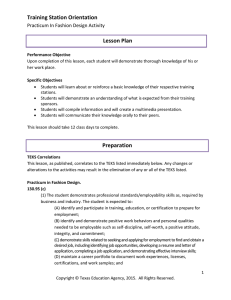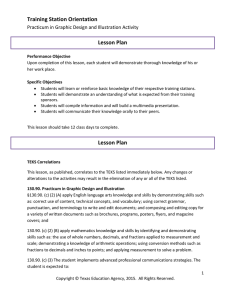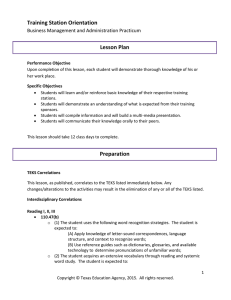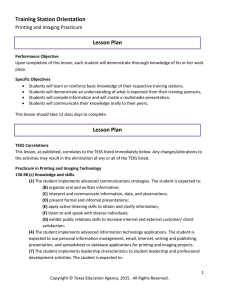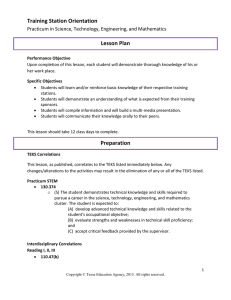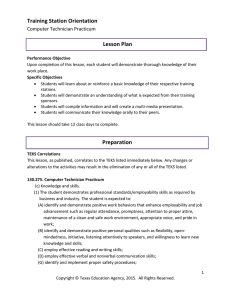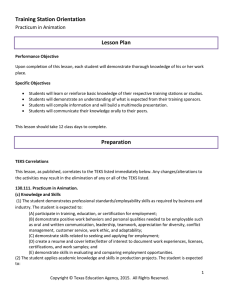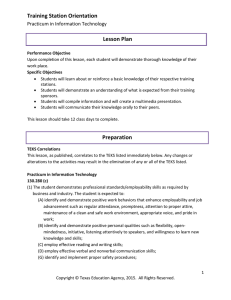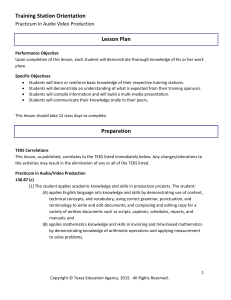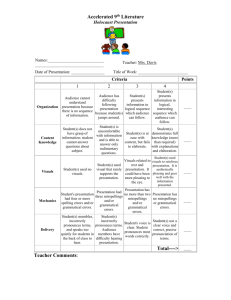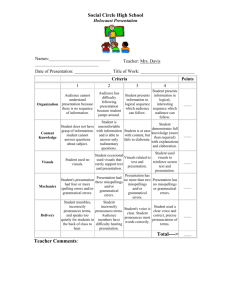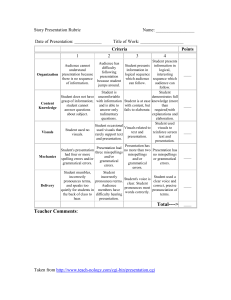Training Station Orientation Lesson Plan Practicum in Commercial Photography
advertisement
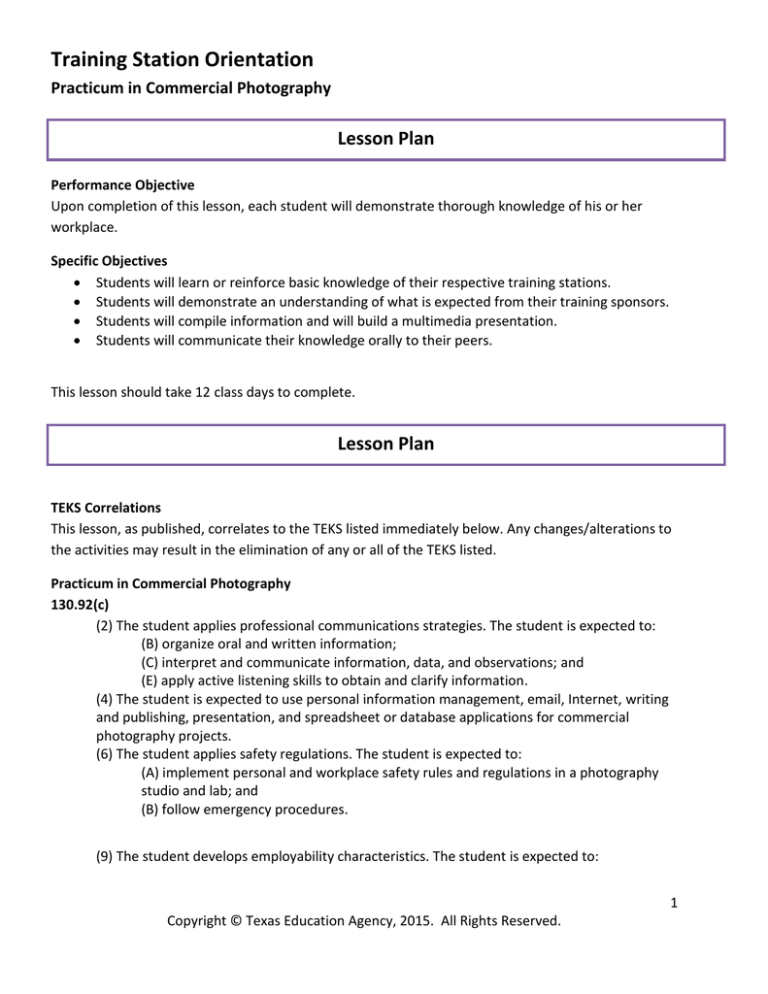
Training Station Orientation Practicum in Commercial Photography Lesson Plan Lesson Plan Performance Objective Upon completion of this lesson, each student will demonstrate thorough knowledge of his or her workplace. Specific Objectives Students will learn or reinforce basic knowledge of their respective training stations. Students will demonstrate an understanding of what is expected from their training sponsors. Students will compile information and will build a multimedia presentation. Students will communicate their knowledge orally to their peers. This lesson should take 12 class days to complete. Lesson Plan Lesson Plan TEKS Correlations This lesson, as published, correlates to the TEKS listed immediately below. Any changes/alterations to the activities may result in the elimination of any or all of the TEKS listed. Practicum in Commercial Photography 130.92(c) (2) The student applies professional communications strategies. The student is expected to: (B) organize oral and written information; (C) interpret and communicate information, data, and observations; and (E) apply active listening skills to obtain and clarify information. (4) The student is expected to use personal information management, email, Internet, writing and publishing, presentation, and spreadsheet or database applications for commercial photography projects. (6) The student applies safety regulations. The student is expected to: (A) implement personal and workplace safety rules and regulations in a photography studio and lab; and (B) follow emergency procedures. (9) The student develops employability characteristics. The student is expected to: 1 Copyright © Texas Education Agency, 2015. All Rights Reserved. (B) demonstrate positive work behaviors and personal qualities needed to be employable; and (E) demonstrate skills in evaluating and comparing employment opportunities. (10) The student is expected to employ planning and time management skills to complete work tasks, such as creating quotes and budgeting. The student is expected to: (A) employ planning and time management skills to complete work tasks; and (B) demonstrate skills in budgeting and creating quotes for freelance or contract projects. Interdisciplinary Correlations Reading I, II, III 110.47(b) (1) The student uses the following word recognition strategies. The student is expected to: (A) Apply knowledge of letter-sound correspondences, language structure, and context to recognize words; (B) Use reference guides such as dictionaries, glossaries, and available technology to determine pronunciations of unfamiliar words; (2) The student acquires an extensive vocabulary through reading and systemic word study. The student is expected to: (A) Expand vocabulary by reading, viewing, listening, and discussing; (B) Determine word meanings through the study of their relationships to other words and concepts such as content, synonyms, antonyms, and analogies; (4) The student comprehends text using effective strategies. The student is expected to: (A) Use prior knowledge and experience to comprehend; (B) Determine and adjust purpose for reading; and (D) Summarize texts by identifying main ideas and relevant details. Public Speaking I, II, III 110.57 (b) (4) Organization. The student organizes speeches. The student is expected to: (B) Organize speeches effectively for specific topics, purposes, audiences, and occasions. (7) Delivery. The student uses appropriate strategies for rehearsing and presenting speeches. The student is expect to: (C) Develop verbal, vocal, and physical skills to enhance presentations. Tasks Students will interview employer or owner to obtain necessary information. Students will obtain company information from employee handouts, trade journals, or employee handbooks. 2 Copyright © Texas Education Agency, 2015. All Rights Reserved. Accommodations for Learning Differences It is important that lessons accommodate the needs of every learner. These lessons may be modified to accommodate your students with learning differences by referring to the files found on the Special Populations page of this website (cte.unt.edu). Preparation Secure the computer lab if you do not have immediate access to one in your classroom. Copy the handout sheets and rubric for the students. Instructional Aids Student handouts Grading rubric Internet access Materials Needed Paper for essay Camera or phone with camera Flash drive Equipment Needed Computers (for students to complete project) Projector (for digital presentation) Scanner (to scan pictures or materials brought to class) 3 Copyright © Texas Education Agency, 2015. All Rights Reserved. Outline MI OUTLINE NOTES TO TEACHER Assignment Outline: I. Directions: a. The packet of information must be completed by interview, website, or handbook. b. Minimum of 12 digital photos c. Floor plan may be scanned II. Grading: a. Completion of packet b. Multimedia presentation c. Pictures d. Professionalism during presentation III. Presentation must have: a. Name and logo b. Floor plan c. Policies/procedures d. Company history e. Supervisor’s or owner’s previous experience f. Site of company g. Organizational chart h. Inclusion: i. 3, 2, 1 IV. Layout format must be followed ***Handout the Portfolio Guidelines (p. 193) Copy the instructions and grading rubric and make into a packet. Tell the class about some of the things you learned at previous jobs. Explain how those skills helped you to become a teacher. Explain the necessity of learning as much as possible about a job because some of the skills learned will help with future employment. Explain to the class that customers see a business much differently than the employees see it. Ask the class if they have ever wanted to work at a place where they shopped. Have them give reasons why they wanted to work there. Go over all the criteria in the assignment and check for understanding. Explain the guidelines. Students can set it up while working on the Training Station Orientation project. Multiple Intelligences Guide Interpersonal Existentialist Intrapersonal Kinesthetic/Bodily Logical/Mathematical Musical/Rhythmic Naturalist Verbal/Linguistic Visual/Spatial 4 Copyright © Texas Education Agency, 2015. All Rights Reserved. Application Guided Practice Using the digital presentation, the teacher will go over the requirements of this project. The student will follow along and make notes on their hard copy. Students will be strongly encouraged to take the assignment packet to their job sites so employers will know about the activity. Ask students to “map” out their plan, using a Mapping Tool from the appendix of this document. Give some ideas to students during the brainstorming session before the end of the first class period. Independent Practice Employer Project Students will work at their own pace to complete this activity. All work (except for employer interviews) is to be done in class, so the teacher can check for understanding. Students will conduct interviews with various employers. Students will ask employers work-related questions. The students will imagine what they would do in given situations. Students are strongly encouraged to take ownership of this activity and to establish a workable pace in order to complete the project on time. Students should be prepared to present their projects to the class. 5 Copyright © Texas Education Agency, 2015. All Rights Reserved. Employer Project Directions: You are to complete this packet of information by conducting interviews with employers and coworkers. If you have an employee training manual, you may use it as a source. You may have to get some information from your company’s website. In addition to the packet, you must include a minimum of 12 digital photos in your presentation. You may bring the pictures to class on a flash drive, a memory card or CD to import into your project. All information will be compiled to prepare a multimedia presentation, which will be shown to the class when you present your project. You will be graded on: Completion of the packet Multimedia presentation Use of pictures (as specified) Professionalism during presentation, including professional dress **Bonus credit will be given if your employer attends your presentation! Presentation must have: Name and logo of company Floor plan Policies and procedures History of the company Supervisor’s (or owner’s) previous experience Site of company (including number of employees) Organizational chart Miscellaneous supplemental information Photos (either interspersed within presentation or at the end of the presentation) If you were in charge, explain: Three things you like about the training station Two things you would change One thing you have learned that will help you in your career choice This project is due on: ___________________________ 6 Copyright © Texas Education Agency, 2015. All Rights Reserved. Layout Format: 1. 2. 3. 4. Student’s name Company’s name, address Type of company In a minimum of 75 words (typed and turned in separately), state what your first day on the job was like. 5. Procedures for reporting to work 6. Procedures for calling in sick or calling in late 7. Procedures for asking for time off 8. What types of benefits are available 9. Length of time manager or owner has been with company 10. What prior training did the manager or owner have? 11. What type of education is needed for a managerial position with the company? 12. Procedure for handling cash or legal documents (beginning and ending shifts), OR 13. Procedure for accessing or handling client’s files 14. Names of competitors and their locations 15. Organizational chart 16. Floor plan 17. Names of vendors and suppliers 18. Procedures for handling returns, issuing credit, keeping clientele happy 19. What types of jobs/careers will your current training station prepare you for? 20. What is the procedure for handling theft (by employees or clientele)? 21. What is the strangest thing that has happened to you on the job? 7 Copyright © Texas Education Agency, 2015. All Rights Reserved. Summary Review Why do customers see a different perspective of a business operation than that of the employees? Why is it important to learn as much as possible about the business establishment? Why are procedures established and expected to be followed? Evaluation Informal Assessment Instructor will observe students during guided practice and independent practice. Instructor will assist students as needed. Formal Assessment Use the Individual Presentation Rubric to evaluate. 8 Copyright © Texas Education Agency, 2015. All Rights Reserved. Individual Presentation Rubric Presentation Title: ___________________________________________________________ Name: ___________________________ Teacher: ___________________________ ID#: _____________________________ Date of Presentation:_________________ Criteria Points 0-5 6-10 11-15 16-20 Organization Audience cannot understand presentation because there is no sequence of information. Audience has difficulty following presentation because student jumps around. Student presents information in logical sequence, which the audience can follow. Student presents information in a logical, interesting sequence, which the audience can follow. Content Knowledge Student does not have grasp of information; student cannot answer questions about subject. Student is uncomfortable with information and is only able to answer rudimentary questions. Student is at ease with content, but fails to elaborate. Student demonstrates full knowledge (more than required) with explanations and elaboration. Visuals Student used no visuals. Student occasionally used visuals that rarely support text and presentation. Visuals related to text and presentation. Student used visuals to reinforce screen text and presentation. Mechanics Student’s presentation had four or more spelling errors and/or grammatical errors. Presentation had three misspellings and/or grammatical errors. Presentation had no more than two misspellings and/or grammatical errors. Presentation had no misspellings and/or grammatical errors. Delivery Student mumbles, incorrectly pronounces terms, and speaks too quietly for students in the back of the class to hear. Student incorrectly pronounces terms. Audience members have difficultly hearing presentation. Student’s voice is clear. Student pronounces most words correctly. Student used clear voice and correct, precise pronunciation of terms. Total: Teacher Comments: 9 Copyright © Texas Education Agency, 2015. All Rights Reserved.
